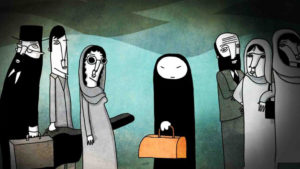 Review: Directress Film Festival
Review: Directress Film Festival
Window Horses | Ann Marie Fleming | Canada | 2016 | 85 minutes
WUD Film Directress Film Festival, Union South Marquee Theater, Sunday, March 12, 1:00pm»
Emily Caulfield concludes our coverage of WUD Film’s Directress Film Festival with a look at Canadian animator Ann Marie Fleming’s latest feature, Window Horses.
Editor’s Note: The WUD Film Directress Film Festival continues through Sunday, featuring great films like Hooligan Sparrow and Lovesong. We have reviewed Evolution and Certain Women this week, and you can read our Missed Madison review of Toni Erdmann here. Meanwhile, check out the entire schedule, as well as previews at The Capital Times and LakeFrontRow.
Canadian crowd favorite Ann Marie Fleming (The Magical Life of Long Tack Sam) returns with Window Horses (The Poetic Persian Epiphany of Rosie Ming), a warm and charming multicultural feature about family, history, and poetry that shines as bright as gleaming marble, minarets in the summer sun.
Animation powerhouse Fleming has been drawing her on-again, off-again avatar Stickgirl since an accident in art school left her with limited mobility. She powerfully uses Stickgirl’s iconic blank face with two small dashes to explore questions of identity and voice, culture and immigration in Window Horses.
Based on Fleming’s graphic novel of the same name, this National Film Board of Canada and Stickgirl co-production provides an essential counterpoint to today’s news. In production since 2014, Fleming and her colleagues could not have predicted the state of the global immigration today. However, Window Horses delivers a refreshingly human and unexpectedly funny tale about this complex and often misrepresented issue.
Stickgirl portrays Rosie Ming (voiced by Sandra Oh, also executive producer), a young Canadian Francophile who spends her days as a fast food clerk and her evenings composing poetry, dreaming of berets and bikes and baguettes under the Eiffel Tower. After self-publishing a volume of poems in the opening scenes of the film, she is delighted to find an invitation to an International Poetry Festival addressed to her. Delight turns to dismay however, when she learns the festival is held in Shiraz, Iran, rather than her beloved France. But Rosie—ever brave, ever plucky—decides to go, even though she’s never traveled outside of Canada, and never anywhere without her overly cautious Chinese maternal grandparents (voiced by Nancy Kwan and Eddy Ko), with whom she’s lived since she was seven.
Rosie was seven when her mother died, shortly after her Iranian father mysteriously disappears. Or, in Rosie’s parlance, left them forever. We begin to understand that this might be more than a poetry invitation. All of a sudden it’s a hero’s journey, and we’re here to witness Rosie’s transformation as she navigates her way through a Muslim country, a modern girl who must discover her own past before she can discover her voice.
Before she leaves, her grandmother gives her a present, something to cover her short pink skirt in Iran. Rosie slips it on while flying over, a traditional black chador that covers everything but her wide-eyed, open face. Much is made in the film about why a young Canadian woman would wear the chador, and there are several very funny fish-out-of-water moments as Rosie learns the ropes of Iran. Fleming’s grasp of foreigners in a foreign country and the kind of hospitality specific to Iran is pitch perfect, and the voice actors she assembled to tell this tale spark with chemistry.
Visually, the film really begins to open up once we’ve landed in Shiraz. In addition to her multicultural cast (German poets from Paris, Chinese ex-pats, American teachers, oh my!), Fleming also called on many different Iranian, Canadian, and Chinese animators to express the stories of each character, the history of Iran and China, the lives of Rumi and Hafez, gorgeous passages in gloriously diverse styles. This rich tapestry of people and voices reflects our shared human history, our art, our song. It’s both visually stunning and incredibly effective: we are united. We can be defined by this beauty. We can be defined by our art.
In Rosie’s case, she must be defined by her art but not before she defines her family. Everyone in Shiraz seems to know her father, but she can’t find him. She passes the time speaking to the other poets, making friends. She spars with Dietmar, a snarky know-it-all German (aced by actor Don Mckellar). Mehrnaz (played powerfully by Shohreh Aghdashloo), the cultural ambassador of the festival, encourages her to read the classics. A tour guide dazzles with stories of the Sufi mystics, the gilded tradition of poetry in Iran. She meets Di Di, an exiled Chinese poet (voiced by Jun Zhu), who tells her of her other history, her Chinese heritage, Tiananmen Square and the political and social unrest of the 1980s.
The artist’s story, the journey to find one’s self and one’s style, took main stage for me in this film, although I suspect some might find that Rosie’s personal quest to find her father more emotional. The personal drama, particularly its resolution, felt more to me like a device in order to tell this unifying story. Strong women and mixed race women are underrepresented in every aspect of film and it’s powerful to see Rosie up on the big screen. It’s transformative to put names and voices with headlines and history. It’s important to hear these stories, regardless of how or when people moved where and why.
Many westerners began as displaced people living in a diaspora. This is a story about how to belong to your culture, and your country, whether or not they are the same place on the map.